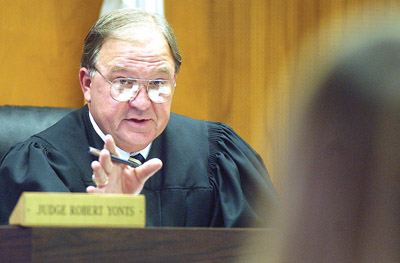A judge Wednesday ruled to deny a resident’s attempt to remove
the Growth Control Initiative from the March ballot and immediately
enact it as a previously passed ordinance.
The lawsuit challenged the legality of language in a signature
referendum that put the controversial measure on the ballot, but
the judge said state election laws do not clearly apply to
referendums.
A judge Wednesday ruled to deny a resident’s attempt to remove the Growth Control Initiative from the March ballot and immediately enact it as a previously passed ordinance.
The lawsuit challenged the legality of language in a signature referendum that put the controversial measure on the ballot, but the judge said state election laws do not clearly apply to referendums.
Therefore, he denied the writ of mandate – filed by San Juan Bautista resident Rebecca McGovern – to remove the initiative from the ballot.
McGovern and her attorneys with the environmental firm, Earthjustice, anticipated a victory would lead to re-establishment of the initiative as the ordinance passed in April by the Board of Supervisors. The referendum led to the Board rescinding that approval and sending it to the voters.
“The referendum shall remain on, or be placed on, the March 2004 ballot,” said visiting Santa Cruz Superior Court Judge Robert Yonts – moments later, his decision resulting in applause from a gallery of about 30 residents.
McGovern’s attorneys had claimed two statements, allegedly mandated by the state Elections Code, were wrongly left off the referendum.
Yonts, however, disagreed. While state law requires that certain signature petitions include the wording, he said there is “uncertainty and confusion” whether it applies in this case.
“I just have to say that justice prevailed,” said Tom Tobias, chairman of the No on Measure G Committee; Tobias is also the county’s Farm Bureau president. “People want to see it on the ballot, and that’s where it should be.”
The ruling from Yonts – appointed in early November after the county’s two local judges disqualified themselves because of conflicts – set the stage for an appeal process.
After the 2 p.m. hearing, McGovern’s two attorneys said they plan to file with the California Court of Appeals for the 6th District within a week. If that court jurisdiction accepts the case, it would be heard in San Jose.
“I think the judge made a mistake,” McGovern said. “It’s just going to prolong the whole thing.”
If Earthjustice’s attempt with the Court of Appeals fails, it would likely close at least one chapter on the divisive Growth Control Initiative issue.
The initiative has been the subject of debate since it was drafted about a year ago. After the Board approved it outright as an ordinance, the No on Measure G Committee collected signatures from nearly 6,000 residents to have the Board repeal it. Then the supervisors – despite legal advice against it, citing the omitted language from the referendum – voted to send the initiative to the ballot.
Members in attendance from the No on Measure G Committee exulted after Wednesday’s ruling – at least for now. After the hearing adjourned, they shook hands, hugged and smiled as they left the courtroom.
“We’re hoping they don’t (appeal). We’re hoping they accept the judge’s decision,” Tobias said.
His committee defended the case, even though the Board was the party being sued; the supervisors voted in early October in closed session to remain impartial on the matter, and did not appoint the county counsel to the case.
The Earthjustice attorneys said they remained confident in an appeal. Attorney Trent Orr said he went into Wednesday’s proceeding uncertain how the judge would rule.
“We still think we have a very strong case on the merits,” Orr said. “There is definitely an appeal coming, very soon.”
Tobias, meanwhile, said members of the committee met after the hearing and decided to file a claim against the county – because it stayed out of the suit – seeking attorneys’ costs for the case. The Board’s non-action, Tobias said, forced the committee to defend the county’s residents at a “great expense.”
“We’re fighting for everybody to have a say in the matter,” Tobias said.
When Supervisor Bob Cruz found out about the intentions of the No on Measure G Committee, he responded: “We knew (a court challenge) was going to happen. And we’re going to fight something we know we’re going to lose? We’re not going to waste money on a losing battle. What is Tom, stupid, or what? You can quote me on that.”
Supervisor Reb Monaco, however, said he was pleased with the ruling. Monaco was the only supervisor to vote against the ordinance in April. And he was reportedly the only supervisor to disapprove of the county’s non-action in the McGovern case.
“I would just like to see it behind us and allow the voters to get educated on the issue,” Monaco said.
That was a sentiment shared by Janet Brians, one of the initiative’s authors, who attended the hearing Wednesday.
“I think we’ll continue educating people, which has been our main activity for the last year, so we’ll continue with that,” Brians said.
She’s not alone. Ranchers Joe and Julie Morris will hold their third consensus building workshop this weekend – a continuing effort to find an agreeable solution to growth management in the county.
The initiative is a proposed amendment to the county’s General Plan. Among several growth control tools, it would restrict property owners of agricultural tracts from subdividing their land.
The two omitted statements questioned in the suit relate to: The paid or volunteer status of signature gatherers and penalties for misuse of a referendum by a signature gatherer.
McGovern on Wednesday evening said she was “sorry” that so much misinformation has been circulated about the initiative.
“The initiative, its purpose, is to save the farmland,” she said.










